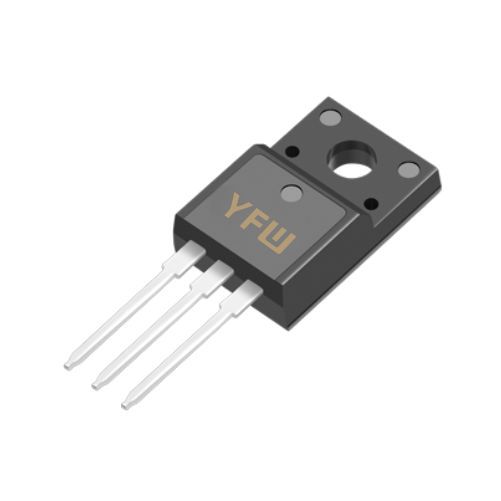Semiconductors are materials with electrical conductivity Between conductors and insulators,allowing precise control of electron flow. Silicon, the most widely used semiconductor material, revolutionized electronics due to its abundance, stability, and ability to form intricate circuits. However, advancements in compound semiconductors like silicon carbide (SiC) and gallium nitride (GaN) are pushing boundaries further. These wide-bandgap materials offer superior thermal conductivity, higher voltage tolerance, and faster switching speeds, making them ideal for high-power applications in electric vehicles (EVs), 5G infrastructure, and renewable energy systems .
The magic of semiconductors lies in their ability to be engineered into components like diodes, transistors, and integrated circuits (ICs). For instance, diodes, a cornerstone of YFW’s product line, act as one-way valves for electricity, converting alternating current (AC) to direct current (DC) in power supplies. Our 2W04M and 78D05 voltage regulators, designed with precision and adhering to ISO 9001 standards, ensure stable power delivery in consumer electronics and automotive systems . These components are not just parts—they are enablers of functionality, reliability, and efficiency.
Semiconductors permeate every industry, driving innovation and enabling breakthroughs:
Consumer Electronics: Smartphones, laptops, and IoT devices rely on semiconductors for processing, connectivity, and power management. YFW’s diodes and rectifiers are embedded in chargers, ensuring efficient energy conversion for fast-charging technologies .
Automotive Industry: EVs and autonomous vehicles depend on semiconductors for battery management, motor control, and ADAS (Advanced Driver Assistance Systems). SiC-based modules, for example, reduce energy loss in EV inverters, extending driving range .
Renewable Energy: Solar panels and wind turbines utilize semiconductors to convert energy into usable electricity. YFW’s components support grid stability and energy storage solutions, aligning with global sustainability goals .
Healthcare: Implants like pacemakers and diagnostic tools rely on miniaturized semiconductors for precision and reliability. Quantum dots, a type of semiconductor nanocrystal, are even used in bioimaging to detect diseases at early stages .
The semiconductor market is experiencing unprecedented growth, fueled by emerging technologies and global demand. In Q1 2025 alone, global semiconductor sales surged 18.8% year-over-year, reaching $167.7 billion . Key trends shaping this trajectory include:
AI and High-Performance Computing: AI accelerators and data centers demand chips with massive parallel processing capabilities. YFW’s discrete components support the power infrastructure of these systems, ensuring efficient energy distribution .
5G and Connectivity: The rollout of 5G networks requires advanced semiconductors for base stations and IoT devices. GaN-based amplifiers, for instance, enhance signal quality while reducing power consumption .
Sustainability: Green semiconductors, such as those made from SiC and GaN, are reducing carbon footprints by enabling energy-efficient systems. YFW’s commitment to eco-friendly manufacturing aligns with this trend, offering products that meet RoHS standards .
As a trusted semiconductor manufacturer, YFW bridges innovation with practicality. Our products, ranging from rectifier bridges to voltage regulators, are designed for reliability and scalability. With manufacturing facilities in Dongguan and Changzhou, we adhere to rigorous quality control processes, ensuring every component meets international standards .
YFW’s success stems from:
Technical Expertise: Our R&D team stays ahead of industry trends, developing solutions for emerging markets like EVs and renewable energy.
Global Reach: Exporting to over 50 countries, we serve diverse industries, from consumer electronics to industrial automation.
Customer-Centric Approach: We collaborate closely with clients to deliver customized solutions, whether for high-volume orders or niche applications.
While the semiconductor industry thrives, it faces challenges. Miniaturization, critical for enhancing performance, requires advanced lithography techniques like EUV (Extreme Ultraviolet), which demands enormous investment . Supply chain disruptions and geopolitical tensions also pose risks. However, innovations in 3D IC packaging and alternative materials like graphene offer promising solutions .
At YFW, we embrace these challenges as opportunities. By investing in cutting-edge technologies and fostering partnerships, we aim to stay at the forefront of semiconductor innovation, empowering industries to build a smarter, more connected world.
Semiconductors are not mere components—they are the catalysts of progress. From powering everyday devices to enabling groundbreaking technologies, their impact is immeasurable. As the global semiconductor market is projected to exceed $908 billion by 2030 , the demand for reliable, high-performance solutions will only grow. At YFW Microelectronics, we are proud to contribute to this journey, delivering semiconductor components that drive efficiency, sustainability, and innovation. The question isn’t just why semiconductors?—it’s how can we harness their potential to shape a better future?
YFW Microelectronics: Powering Progress, One Semiconductor at a Time.
This article is brought to you by YFW Microelectronics. Visit www.yfwdiode.com to explore our range of semiconductor solutions 